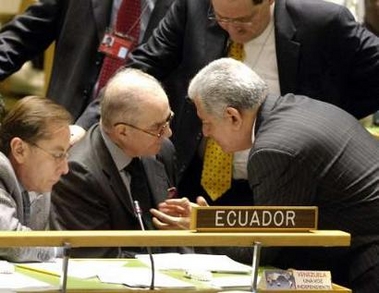UNITED NATIONS - Venezuela and Guatemala failed repeatedly on Tuesday to
garner enough votes to win a two-year seat on the U.N. Security Council,
prompting a 24-hour break to explore how to resolve the impasse.

Venezuela's Deputy Foreign Minister
Jorge Valero (R) speaks with diplomats from Ecuador as the United Nations
General Assembly voted to fill an upcoming vacancy in the Security Council
with a candidate from South America, in New York, October 17, 2006.
Guatemala and Venezuela are the two leading countries to fill the rotating
position for a a two year seat on the Security Council.
[Reuters] |
Brazil's U.N. ambassador, Ronaldo Sardenberg, said Latin American and
Caribbean nations had agreed to hold off voting until Thursday and meet
informally to assess the situation. Venezuela and Guatemala agreed but neither
country withdrew.
In 22 rounds of voting on Monday and Tuesday for a Latin American seat next
year, Guatemala won all but one round which ended in a tie. But neither country
received the two-thirds vote needed in the 192-member General Assembly.
The race has become a battle of influence between the United States and
Venezuela, which under President Hugo Chavez has tried to form an alliance in
Asia, Africa and the Middle East to challenge Washington's interests.
Failure to get into the U.N. Security Council would represent a setback for
Chavez's ambitions for a bigger international profile.
Guatemala's visiting foreign minister, Gert Rosenthal, told reporters that
small countries who never had a Security Council seat had the right to
participate in the council's work.
"But we also are concerned about the integrity of the General Assembly," he
said. "We are not going to fight this for weeks and weeks. We want to see how it
evolves over the next few days" before making a decision on whether to drop out.
Venezuela said it would only give up its quest for a Security Council seat if
President George W. Bush and his U.N. ambassador, John Bolton, stopped their
"extortion" campaign on behalf of rival Guatemala.
"Venezuela is not stepping down," said its U.N. Ambassador Francisco Javier
Arias Cardenas.
Bolton responded: "I know arm twisting when I see it. And it is not happening
on the part of the United States."
Both Bolton and Rosenthal said it was normal in this situation that the
losing country withdraw from the race.
"You can draw one conclusion: Venezuela is not going to win. So the question
then is whether the decision to stay in is going to take us to record
territory," Bolton said.
In 1979, a contest between Colombia and Cuba went to 155 rounds, with Mexico
emerging in the end as the compromise candidate.
NEW CANDIDATE?
Chile for one was pushing for a new candidate.
"Chile continues to think that it is necessary to have a consensus candidate,
a candidate of unity," said its U.N. ambassador, Heraldo Munoz.
Other diplomats were urging Latin American states to look as a group for a
compromise as a way out of the impasse.
"They'd better meet. Otherwise, we'll never get there," Denmark's U.N.
ambassador, Ellen Margrethe Loj, told Reuters.
The Security Council has 15 seats: five permanent members with veto power --
the United States, Russia, China, Britain and France -- and 10 nations serving
for two-year terms, five of them elected each year.
In other regions, South Africa, Indonesia, Italy and Belgium received the
necessary votes on Monday to win two-year terms in the council beginning on
January 1. They replace Tanzania, Japan, Denmark and Greece.
Next year will mark the first time South Africa will have a seat on the
council, whose decisions on peace and security are mandatory for all U.N.
members.
Venezuela and Guatemala are vying for the Latin American seat being vacated
by Argentina while Peru stays on the Security Council until the end of 2007
along with the Congo Republic, Ghana, Qatar and Slovakia.